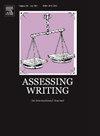比较基于gpt的自动写作评价方法
IF 5.5
1区 文学
Q1 EDUCATION & EDUCATIONAL RESEARCH
引用次数: 0
摘要
像OpenAI的GPT模型这样的大型语言模型(llm)在自动写作评估(AWE)中显示出了巨大的前景。然而,目前的研究主要集中在非微调的GPT模型上,对微调模型以及模型类型、提示策略、数据集特征等潜在影响性能的因素关注较少。本研究比较了六种基于gpt的托福论文写作评估方法,即GPT-3.5零射击、GPT-3.5少射击、GPT-4零射击、GPT-4少射击和两种微调方法。我们评估了模型类型(GPT-3.5 vs. GPT-4)、提示策略(零投篮vs.少投篮)、微调、类别不平衡和数据集转移对性能的影响。我们的研究结果表明,经过微调的GPT模型始终优于非微调的GPT-4模型,而非微调的GPT-4模型又优于GPT-3.5模型。在本研究中,少针提示没有显示出明显优于零针提示。此外,类别不平衡和数据集移位会对模型的准确性和可靠性产生负面影响。这些结果为了解不同基于gpt的方法的有效性以及影响其在AWE中表现的因素提供了有价值的见解。本文章由计算机程序翻译,如有差异,请以英文原文为准。
Comparing GPT-based approaches in automated writing evaluation
Large language models (LLMs) like OpenAI’s GPT models show significant promise in automated writing evaluation (AWE). However, recent research has mainly focused on non-fine-tuned GPT models, with limited attention to fine-tuned models as well as potential factors influencing performance, such as model type, prompting strategy, and dataset characteristics. This study compares six GPT-based approaches for evaluating TOFEL argumentative writing, namely, GPT-3.5 zero-shot, GPT-3.5 few-shot, GPT-4 zero-shot, GPT-4 few-shot, and two fine-tuning methods. We assess the impact of model type (GPT-3.5 vs. GPT-4), prompting strategy (zero-shot vs. few-shot), fine-tuning, class imbalance and dataset shift on performance. Our findings reveal that fine-tuned GPT models consistently outperform non-fine-tuned GPT-4 models, which in turn outperform GPT-3.5 models. Few-shot prompting does not show clear advantages over zero-shot prompting in this study. Additionally, class imbalance and dataset shift negatively affect model accuracy and reliability. These results offer valuable insights into the effectiveness of different GPT-based approaches and the factors that influence their performance in AWE.
求助全文
通过发布文献求助,成功后即可免费获取论文全文。
去求助
来源期刊

Assessing Writing
Multiple-
CiteScore
6.00
自引率
17.90%
发文量
67
期刊介绍:
Assessing Writing is a refereed international journal providing a forum for ideas, research and practice on the assessment of written language. Assessing Writing publishes articles, book reviews, conference reports, and academic exchanges concerning writing assessments of all kinds, including traditional (direct and standardised forms of) testing of writing, alternative performance assessments (such as portfolios), workplace sampling and classroom assessment. The journal focuses on all stages of the writing assessment process, including needs evaluation, assessment creation, implementation, and validation, and test development.
 求助内容:
求助内容: 应助结果提醒方式:
应助结果提醒方式:


